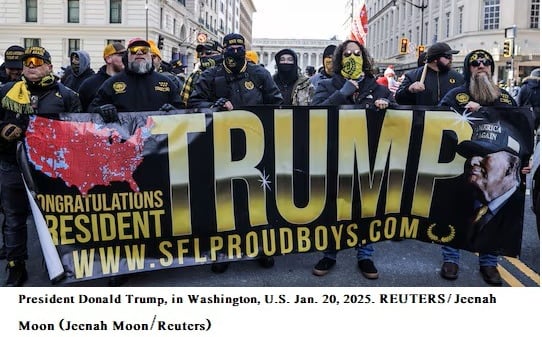Trump’s Pardons for January 6 Defendants Spark Concerns Over Rising Extremism
NEWS


Trump’s Pardons for January 6 Defendants Spark Concerns Over Rising Extremism
Former President Donald Trump's decision to grant clemency to over 1,600 individuals convicted in connection with the January 6 Capitol riot has reignited debates about its impact on political violence and extremism. Among those released are Enrique Tarrio, leader of the Proud Boys, and Stewart Rhodes, founder of the Oath Keepers, both convicted of seditious conspiracy for their roles in the attack.
Trump defended his actions, labeling the sentences “ridiculous and excessive” and framing the pardons as justice for those he claimed were treated unfairly. However, counterterrorism experts warn that this move could embolden extremist groups, complicating efforts to counter domestic terrorism.
Tarrio and Rhodes, previously serving lengthy sentences, were freed to public and media attention. Tarrio had led the Proud Boys in their violent efforts to challenge the 2020 election results, while Rhodes had urged Trump to use paramilitary groups to remain in power. Both groups had been significantly weakened by legal actions, but experts fear their release might rejuvenate their influence.
Researcher Jacob Ware from the Council on Foreign Relations described the pardons as a "catastrophic moment for domestic counterterrorism," cautioning that these actions could inspire other anti-government groups and intensify recruitment efforts. Similarly, Bruce Hoffman noted parallels to past incidents, such as the 1988 acquittal of white supremacists, which led to a surge in militia activity and the Oklahoma City bombing.
Public opinion on these pardons is divided. A majority of Americans, according to a December poll, opposed clemency for those convicted in the riots. However, significant support exists among Republican voters and Trump supporters, reflecting the deep polarization surrounding the issue.
Critics, including law enforcement officials and counterterrorism researchers, argue that the pardons undermine accountability for violent actions. Former Capitol Police officers and national police organizations have expressed disappointment, emphasizing that such clemency could be seen as diminishing the rule of law and emboldening further attacks against public institutions.
As extremist ideologies gain momentum, analysts caution about potential retaliation and heightened political violence. The normalization of the January 6 riot in political discourse risks further erosion of democratic norms, with experts warning of a troubling trajectory for the nation’s stability and unity.
The repercussions of this decision will likely shape the landscape of political extremism and the challenges facing counterterrorism efforts in the years to come.
